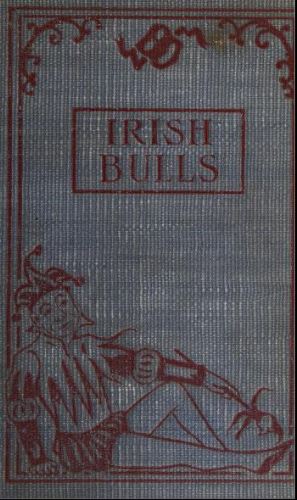McLuhan was of Scotch-Irish extraction and the son of two great raconteurs. He came to Irish bull naturally and the topic appears frequently in Take Today:
Our fathers sometimes encountered paradox in the jocular form of the “Irish Bull”: “When you see three cows standing in a pasture, the one that is sitting is the Irish Bull.” (106)1
One of the chapter headings shortly before this reads:
If you Take the Bull by the Horns You’ll Get a Lot of Bull (93)
Later, giving what may be the formal cause of these bull stories in Take Today, he refers to the “ebullient Bucky Fuller”. (117) McLuhan’s frequent critique of ‘somnambulism’ may be seen in a new light in this context — as may his views on language and logos given their interrelation with ‘vocabulary’.
In the same year that Take Today was published, 1972, McLuhan presented more Irish bull in ‘End of the Work Ethic’:
We live in a world of paradoxes because at electric speed all facets of situations are presented to us simultaneously. It used to be the specialty of “the Irish bull” to do this. For example, a recent example mentions an exchange between two chiropodists. One says: “I have taken the corns off half the crown heads of Europe.”
As detailed in Lodge on ‘Science and Literature’, McLuhan’s mentor in the early 1930s at the University of Manitoba, Rupert Lodge, told the story about the Irishman who asked whether a fight were private or if he might join in. This was repeated 40 years later by McLuhan in Take Today (212):
Is this a private fight, or may anyone join in?
– An Irishman
McLuhan had remembered Lodge in his Speaking of Winnipeg interview with Danny Finkleman and Tom Easterbrook in 1970 and it may be that these Irish bull stories written shortly thereafter came to mind in this way. But McLuhan had quoted Harold Innis on Irish bull long before this in The Gutenberg Galaxy:
Improvements in communication, like the Irish bull of the bridge which separated the two countries, make for increased difficulties of understanding. (GG 216 = Innis in ‘Minerva’s Owl’ from The Bias of Communication, 28)
‘Bull’ is bullshit that illuminates: “paradox in the jocular form of the ‘Irish Bull’.”
In a letter to Allen and Caroline Tate in 1951, McLuhan complained of Vanguard Press, the publisher of The Mechanical Bride, as having “suspected my Irish bulls to be Papal ones.”2 This was to mistake his bullshit with the Catholic variety (said by a Catholic convert to one then in the process of converting).
- H.P. Kelly, Irish Bulls, 1906, p3: “Supposing there were thirteen cows lying down in a field and one of them was standing up; that would be a bull.”

The Irish bull is mentioned by Heine in his 1834 Zur Geschichte der Religion und Philosophie in Deutschland: “Kant hat also nicht(…) die Dinge unterschieden in Phänomena und Noumena, in Dinge, welche für uns existieren, und in Dinge, welche für uns nicht existieren. Dieses wäre ein irländischer Bull in der Philosophie. Er hat nur einen Grenzbegriff geben wollen.” Decades before Heine’s history, Maria Edgeworth and her father published ‘An Essay on Irish Bull’ in 1802. ↩ - McLuhan to Allen and Caroline Tate, October 2, 1951. For the full passage, see On The Mechanical Bride. ↩